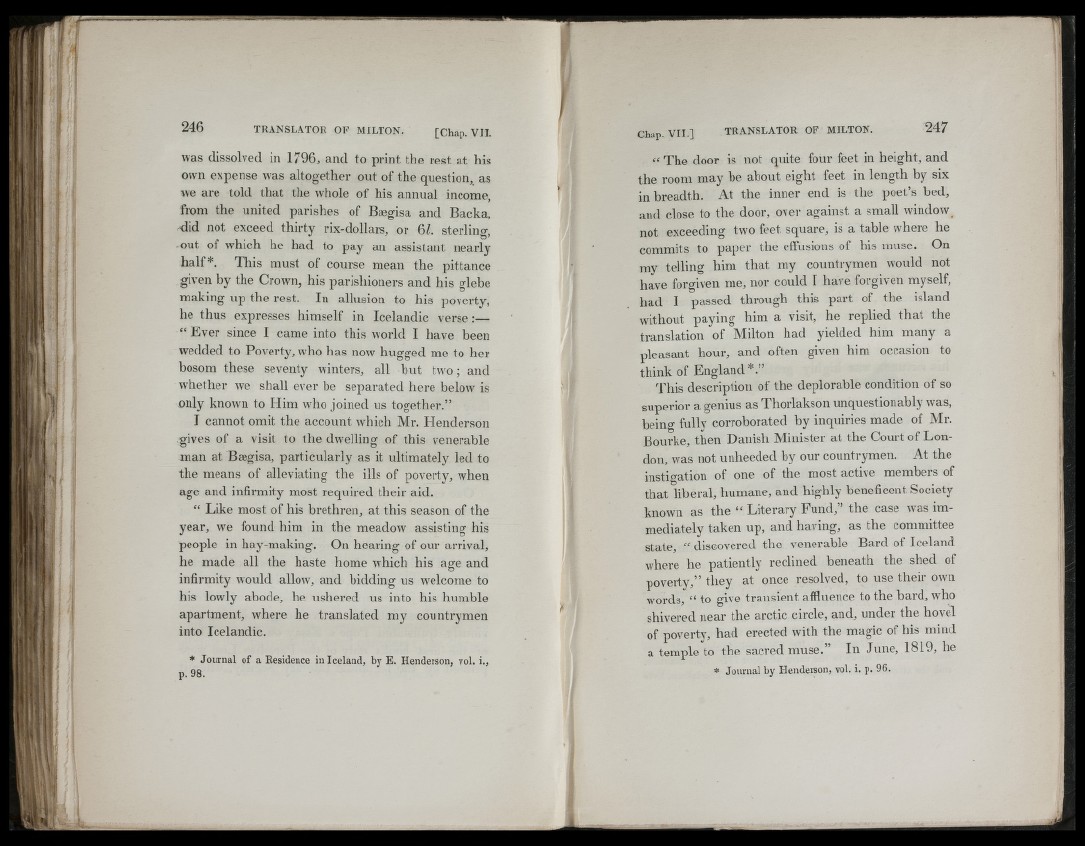
j l
|K.- •*-
I
TRANSLATOR OF MILTON.
was dissolved in 1796, and to print the rest at his
own expense was altogether out of the question, as
we are told that the whole of his annual income,
from the united parishes of Beegisa and Backa,
did not exceed thirty rix-dollars, or 6/. sterling,
out of which he had to pay an assistant nearly
half*. This must of course mean the pittance
given by the Crown, his parishioners and his glebe
making up the rest. In allusion to his poverty,
he thus expresses himself in Icelandic verse:—
“ Ever since I came into this world I have been
wedded to PoA'erty, who has now hugged me to her
bosom these seventy winters, all b u t two; and
whether we shall ever be separated here below is
only known to Him who joined ns together.”
1 cannot omit the account which Mr. Henderson
gives of a visit to the dwelling of this venerable
man at Bsegisa, particularly as it ultimately led to
the means of alleviating the ills of poverty, when
age and infirmity most required their aid.
“ Like most of his brethren, at this season of the
year, we found him in the meadow assisting his
people in hay-making. On hearing of our arrival,
he made all the haste home which his age and
infirmity would allow, and bidding us welcome to
his lowly abode, he ushered us into his humble
apartment, where he translated my countrymen
into Icelandic.
* Journal o f a Residence in Iceland, by E. Henderson, vol. i.,
p. 98.
“ The door is not quite four feet in height, and
the room may be about eight feet in length by six
in breadth. At the inner end is the poet’s bed,
and close to the door, over against a small window
not exceeding two feet square, is a table where he
commits to paper the effusions of his muse. On
my telling him that my countrymen would not
have forgiven me, nor could I have forgiven myself,
had I passed through this part of the island
without paying him a visit, he replied th a t the
translation of Milton had yielded him many a
pleasant hour, and often given him occasion to
think of England*.”
This description of the deplorable condition of so
superior a genius as Thorlakson unquestionably was,
being fully corroborated by inquiries made of Mr.
Bourke, then Danish Minister at the Court of London,
Avas not unheeded by our countrymen. At the
instigation of one of the most active members of
that liberal, humane, and highly beneficent Society
known as the “ Literary Fund,” the case Avas immediately
taken up, and having, as the committee
state, “ discovered the venerable Bard of Iceland
Avhere he patiently reclined beneath the shed of
poverty,” they at once resolved, to use their OAvn
words, “ to give transient affluence to the bard, who
shivered near the arctic circle, and, under the hovel
of poverty, had erected with the magic of his mmd
a temple to the sacred muse.” In June, 1819, he
’i' Journal by Hendersoiu vob i. p. 96.
I